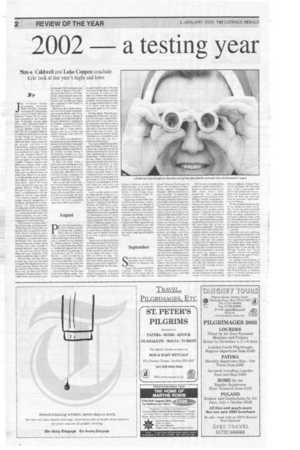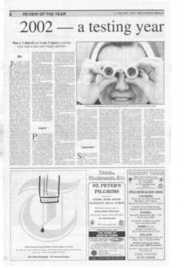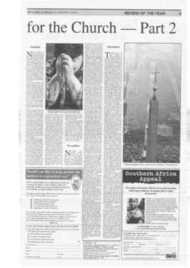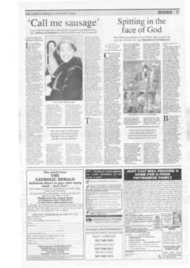Page 3, 3rd January 2003
Page 3

Report an error
Noticed an error on this page?If you've noticed an error in this article please click here to report it.
Tags
Share
Related articles
Synod Ends On An Off Note
Trust Me, I’m A Journalist
A Latter-day Maria Monk
The Contents Of The Faith Zone (above), The Religious...
‘i’ve Been Shot At Since I Was A Catholic’
2002 a testing year SM 41 Caldwell and Luke Coppen conclude
tAr look at last year's highs and lows
Jy
J-u1 ssr tss ed another orstan4c4,1y successful Norld Yin Day. Hundreds cihous of yoimg people from eery i -ribited continent flockedto TC.17.0 for the weeklong cdebratii of the Catholic faith. Ile higtat was the papal 'Mass a the (radian capital's Dowmiew Fir, Addressing an estim ad 80 C.110 people, Pope John Trul II iclienged youths to love theChurlad not to be fooled by the 'many ise illusions and parodies of binint ess". He also addrestd tli amage caused by the claic al rise crisis in the UniteAditates, hing the young not to be clrven ft-cithe Church by the sins ofiminar of priests. If you love Jesus, I cpahe Church!" he said, -*Do not bliscouraged by the sins and fail ims of some of her members. Th.errra done by some priests and rlpous to the young and vtinerablillls us all with a deep seise of airless and shame.Then , after a lunatic pause, he addec1:13ut allotthe vast majority of daclicatud generous priests and religious use only wish is to serve ad to Cgocid!" His words were geetechith cheering and applane. The uly Father. 82, said that even thcsuA he was "old and tired-, he stillidentified with the hopes and fen of young people. "The greateslieception, and the deepes: sour-oof unhappiness, is the illusion of Ming life by excluding Cxl, of ding freedom by excluding mcni truths and personal resporsibility.lhe Lord is calling you to choosUetvween these two voices compeng for your souls. That cecisions the substance and challeige of load Youth Day."
"The yourighave done it again." The herald sal in a leading article. "Whea Pope ihn Paul gazed out at the gnat sea ciyoung faces assembled ii Torcsna, perhaps he gave a passirg thougm to the doomsayers of the press,. i Canada and across the Viestern vdd, whe were gloating inadvancehat, in sharp contrast to recent yen, only a couple of hundred thol.isnd would be there. As with prenu s World Youth Days, the yoag Catholics of the worldprovechem wholly in error."
From Cants, the Pope flew to Guaten. tla, where he canonised local saint Pei° de Betancur. But it was his next aap. Mexico, that will be recalled k. the history books. For ii was hre that John Paul II celebrated th canonisation of the world's first American Indian saint. An estimated 12 million people lined the streets of Mexico City, for a glimpse of the Pontiff as the Popemobile snaked along the mad to the Basilica of Guadalupe, the church founded after the Blessed Virgin Mary appeared to Juan Diego in December 1531.
Back home, the Catholic community mourned the death of pioneering ecumenist Bishop Alan Clark. During his 18 years as Bishop of East Anglia, he was the first Catholic bishop to ordain former Ariglicans to the Catholic priesthood. Cardinal Cormac Murphy-O'Connor described him as "a fine pastoral bishop", who was a "robust and faithful" advocate of the search for Christian unity.
A new bishop was appointed to the Leeds diocese eight months after Bishop David Konstant requested a coadjutor bishop because of his failing health. Bishop Arthur Roche, 52, a former auxiliary bishop in Westminster archdiocese, was named as coadjutor bishop for Leeds with right of succession.
In Italy. the Pope chose a renowned moral theologian to lead Europe's largest diocese. In one of the most significant appointments in recent years, John Paul II named Cardinal Dionigi Tettamanzi to succeed Cardinal Carlo Maria Martini as Archbishop of Milan.
July was also the month that a new English bishop confessed that rugby was his "second religion". hi a revealing interview, Bishop Tom Bums of the Armed Forces said he had been passionate about the sport ever since he was sixth form student in Devon. He is now a qualified rugby union referee and assessor.
August
pfuope John Paul II returned to 's native Poland, possibly or the last time. At Blonie Park in the city of Krakow, where he used to be archbishop, he celebrated the largest Mass in Polish history, attended by an estimated 2.7 million pilgrims. During the Mass. the Pope beatified four Poles — Archbishop Sigmund Felix Felinski, Sister Santia Szymkowiak, Fr John Beyzym and Fr Adalbert Balicki — whom he held up as "stupendous examples" of people who had devoted their lives to the service of God and man. telling the crowd never to separate the "cause of man from the love of God".
He also referred to the Devotion of the Divine Mercy, saying: The message of merciful love needs to resound forcefully anew. The hour has come to bring Christ's message to everyone: to rulers and the oppressed, to those whose humanity and dignity seem lost in the mystery of iniquity. The hour has come when the message of Divine Mercy is able to fill hearts with hope and to become the spark of a new civilisation of love."
The Pope added: "When the noisy propaganda of liberalism, of freedom without truth or responsibility. grows stronger in our country too, the shepherds of the Church cannot fail to proclaim the one fail-proof philosophy of freedom, which is the truth of the Cross of Christ. The Pope concluded the Mass by saying: "God bless you. I would like to add 'until the next time'. but this is entirely in God's hands."
A day earlier, John Paul had dedicated the Basilica of God's Mercy in Lagiewniki, where the visionary St Faustina Kowalska had lived, and there entrusted the world to the Divine Mercy. "I firmly believe that this new church will always be a place where people will come before God in spirit and truth," he said. "They will come with the trust which accompanies all those who humbly open their hearts to the working of God's merciful love, to that love which is stronger than even the greatest sin. Here, in the fire of divine love, human hearts will bum with desire for conversion. and whoever looks for hope will find comfort."
August was the month in which the International Commission of English in the Liturgy (ICEL) ended its long-running dispute with the Vatican's Congregation for Divine Worship and underwent a major shake-up, which involved the appointments of Coadjutor Bishop Arthur Roche of Leeds as chairman and Birmingham priest Fr Bruce Harbert as executive secretary. The outgoing chairman, Bishop Maurice Taylor of Galloway, issued a statement in defence of ICEL, which he believed had been unfairly criticised by senior Vatican officials over the quality and the fidelity of translations from original Latin into English.
August was also the month when Archbishop George Pell of Sydney was retrospectively and falsely accused of sexual assault. The archbishop agreed to stand aside pending an inquiry but issued a statement in which he said: "The allegations against me are lies and I deny them totally and utterly. The alleged events never happened. I repeat emphatically that the allegations are false."
Closer to home, a document called Evangelisation in England and Wales: A Report to the Catholic Bishops, written by the Rev Dr Philip Knights of the Catholic Missionary Society and Andrea Murray of Ushaw College, recognised the importance of the new movements in the Church.
August was also the month when Archbishop Patrick Kelly issued a mysterious letter in an attempt to explain why he needed a sabbatical in the United States, when police refused to prosecute Guardian columnist Julie Burchill for racism after a vicious rant against Irish Catholics, when the bishops of England and Wales argued for the repeal of the blasphemy laws and when Catholic overseas aid agency Cafod issued a report opposing a pre-emptive strike against Saddam Hussein.
September
September was a soul-searching month for the Catholic Church in England and Wales. It began with a major speech by Cardinal Cormac MurphyO'Connor on the current state of the Church. In an address to the annual National Conference of Priests, the Archbishop of Westminster attacked "contemporary liberalism", which he described as "a pretty thin affair". 'It makes feeble claims about the relativity of values and makes ridiculous. indeed sometimes highly shameful, programmes for social and moral living," he said. "The ace up its sleeve is, of course, that it is easy to believe, but Catholicism is not. So we should not be surprised if the attack on the Church today is a subtle one. And we are not to be too discouraged by our weaknesses, our shame or the changes which the media think are obvious for the future of the Church. For Catholicism and the witness it displays, at its heart, is the force that confronts contemporary liberalism." The Church, the Cardinal continued. roust not be afraid to be oppose prevailing values. "If the teachers of the Church. those who are the watchmen, are disheartened, if their dogmatic teaching about God and Christ can be rendered harmless, then they themselves will be reduced to social workers or political advocates," he said. "The Catholic Church, with our fellow Christians, should today be brave and swim against the stream, because we are doing something that is God-given. something that is good, something that is ultimately true." The Cardinal's comments prefigured a new assault on the Church's record on child protection led by BBC Radio Four's Today programme. The programme 'claimed that the Cardinal, while Bishop of Arundel and Brighton, in the 1980s had failed to inform police officers of the activities of the former priest Michael Hill, now a convicted paedophile, and "may have used his influence to pervert the cause of justice". It said that detectives in Sussex were considering an allegation that the Cardinal had repeatedly moved Hill around the diocese in the full knowledge that he was a "dangerous paedophile". The report was understood to have shocked the C,ardinal, who has never been questioned by police about his handling of Hill. A statement from the archbishop's office said: "The Cardinal is dismayed by the approach of the Today programme, which broadcast a package that was both unbalanced and out of proportion to news that the police are engaged in an enquiry." A BBC spokesman said the Church was given an opportunity to defend the Cardinal in an interview after the allegations against him were first presented in documentary form.
September was also the month that the Church paid its last respects to one of its most admired and beloved Cardinals. Cardinal Francois Xavier Nguyen Van 'Thuan died aged 74 after a long struggle with cancer. The cardinal, who was pitsident of the Pontifical Council for Justice and Peace, had spent nine years in communist "reeducation" camp in Vietnam.
He later recalled that shortly after he was arrested, he made a resolution "to live my present moment and to fill it to the brim with love". Held in solitary confinement, he managed to celebrate Mass, using tiny hosts and the palm of his hand as a chalice. After he was released, he spent three years under house arrest in Hanoi before he was exiled to Australia.
September also saw a surprising ecumenical gesture in Belgium. The Catholic Bishop of Antwerp asked God's forgiveness for the burning of a founding father of the English Reformation almost 500 years ago. Bishop Paul van der Berghe said William Tyndale was "killed unjustly" when he was garrotted and burned at the stake in Vilvo°Me. Belgium, in 1536.
In a gesture of reconciliation. he offered his chair, the symbol of his authority to teach on faith and morals, to Anglican Bishop Geoffrey Rowell during an Anglican service of choral evensong in the city's Catholic cathedral.
blog comments powered by Disqus











